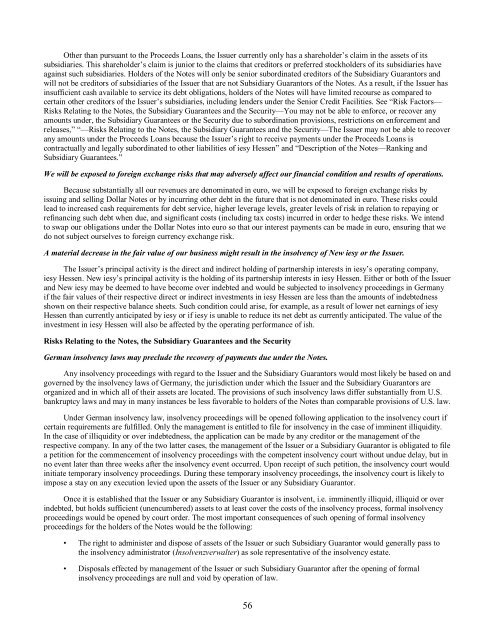iesy Repository GmbH - Irish Stock Exchange
iesy Repository GmbH - Irish Stock Exchange
iesy Repository GmbH - Irish Stock Exchange
You also want an ePaper? Increase the reach of your titles
YUMPU automatically turns print PDFs into web optimized ePapers that Google loves.
Other than pursuant to the Proceeds Loans, the Issuer currently only has a shareholder’s claim in the assets of its<br />
subsidiaries. This shareholder’s claim is junior to the claims that creditors or preferred stockholders of its subsidiaries have<br />
against such subsidiaries. Holders of the Notes will only be senior subordinated creditors of the Subsidiary Guarantors and<br />
will not be creditors of subsidiaries of the Issuer that are not Subsidiary Guarantors of the Notes. As a result, if the Issuer has<br />
insufficient cash available to service its debt obligations, holders of the Notes will have limited recourse as compared to<br />
certain other creditors of the Issuer’s subsidiaries, including lenders under the Senior Credit Facilities. See “Risk Factors—<br />
Risks Relating to the Notes, the Subsidiary Guarantees and the Security—You may not be able to enforce, or recover any<br />
amounts under, the Subsidiary Guarantees or the Security due to subordination provisions, restrictions on enforcement and<br />
releases,” “—Risks Relating to the Notes, the Subsidiary Guarantees and the Security—The Issuer may not be able to recover<br />
any amounts under the Proceeds Loans because the Issuer’s right to receive payments under the Proceeds Loans is<br />
contractually and legally subordinated to other liabilities of <strong>iesy</strong> Hessen” and “Description of the Notes—Ranking and<br />
Subsidiary Guarantees.”<br />
We will be exposed to foreign exchange risks that may adversely affect our financial condition and results of operations.<br />
Because substantially all our revenues are denominated in euro, we will be exposed to foreign exchange risks by<br />
issuing and selling Dollar Notes or by incurring other debt in the future that is not denominated in euro. These risks could<br />
lead to increased cash requirements for debt service, higher leverage levels, greater levels of risk in relation to repaying or<br />
refinancing such debt when due, and significant costs (including tax costs) incurred in order to hedge these risks. We intend<br />
to swap our obligations under the Dollar Notes into euro so that our interest payments can be made in euro, ensuring that we<br />
do not subject ourselves to foreign currency exchange risk.<br />
A material decrease in the fair value of our business might result in the insolvency of New <strong>iesy</strong> or the Issuer.<br />
The Issuer’s principal activity is the direct and indirect holding of partnership interests in <strong>iesy</strong>’s operating company,<br />
<strong>iesy</strong> Hessen. New <strong>iesy</strong>’s principal activity is the holding of its partnership interests in <strong>iesy</strong> Hessen. Either or both of the Issuer<br />
and New <strong>iesy</strong> may be deemed to have become over indebted and would be subjected to insolvency proceedings in Germany<br />
if the fair values of their respective direct or indirect investments in <strong>iesy</strong> Hessen are less than the amounts of indebtedness<br />
shown on their respective balance sheets. Such condition could arise, for example, as a result of lower net earnings of <strong>iesy</strong><br />
Hessen than currently anticipated by <strong>iesy</strong> or if <strong>iesy</strong> is unable to reduce its net debt as currently anticipated. The value of the<br />
investment in <strong>iesy</strong> Hessen will also be affected by the operating performance of ish.<br />
Risks Relating to the Notes, the Subsidiary Guarantees and the Security<br />
German insolvency laws may preclude the recovery of payments due under the Notes.<br />
Any insolvency proceedings with regard to the Issuer and the Subsidiary Guarantors would most likely be based on and<br />
governed by the insolvency laws of Germany, the jurisdiction under which the Issuer and the Subsidiary Guarantors are<br />
organized and in which all of their assets are located. The provisions of such insolvency laws differ substantially from U.S.<br />
bankruptcy laws and may in many instances be less favorable to holders of the Notes than comparable provisions of U.S. law.<br />
Under German insolvency law, insolvency proceedings will be opened following application to the insolvency court if<br />
certain requirements are fulfilled. Only the management is entitled to file for insolvency in the case of imminent illiquidity.<br />
In the case of illiquidity or over indebtedness, the application can be made by any creditor or the management of the<br />
respective company. In any of the two latter cases, the management of the Issuer or a Subsidiary Guarantor is obligated to file<br />
a petition for the commencement of insolvency proceedings with the competent insolvency court without undue delay, but in<br />
no event later than three weeks after the insolvency event occurred. Upon receipt of such petition, the insolvency court would<br />
initiate temporary insolvency proceedings. During these temporary insolvency proceedings, the insolvency court is likely to<br />
impose a stay on any execution levied upon the assets of the Issuer or any Subsidiary Guarantor.<br />
Once it is established that the Issuer or any Subsidiary Guarantor is insolvent, i.e. imminently illiquid, illiquid or over<br />
indebted, but holds sufficient (unencumbered) assets to at least cover the costs of the insolvency process, formal insolvency<br />
proceedings would be opened by court order. The most important consequences of such opening of formal insolvency<br />
proceedings for the holders of the Notes would be the following:<br />
• The right to administer and dispose of assets of the Issuer or such Subsidiary Guarantor would generally pass to<br />
the insolvency administrator (Insolvenzverwalter) as sole representative of the insolvency estate.<br />
• Disposals effected by management of the Issuer or such Subsidiary Guarantor after the opening of formal<br />
insolvency proceedings are null and void by operation of law.<br />
56

















